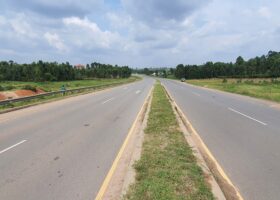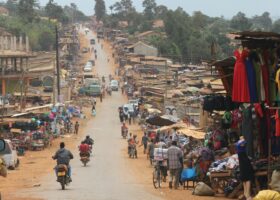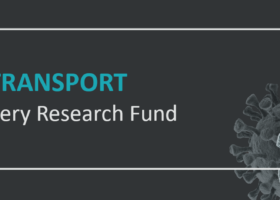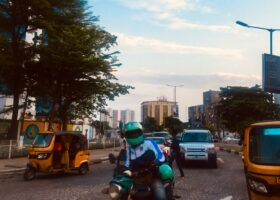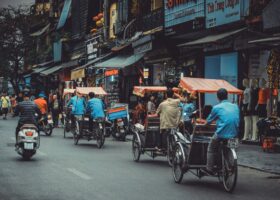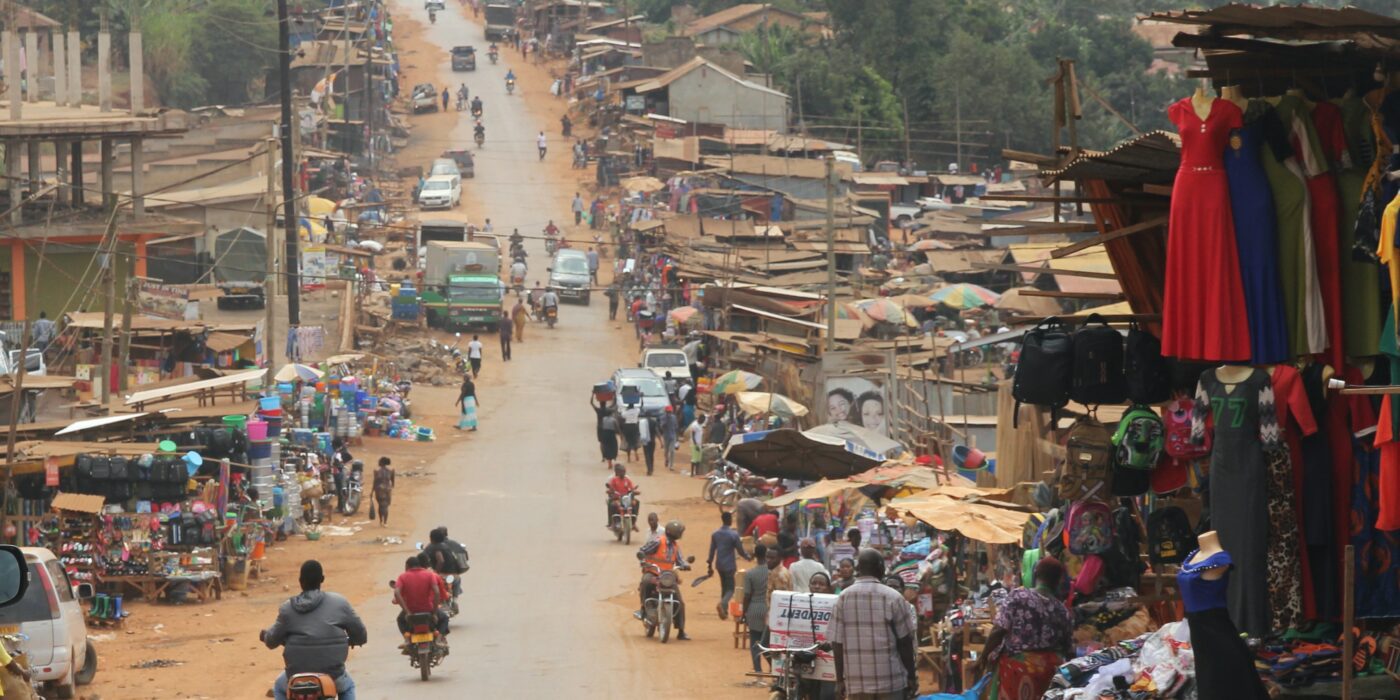
Overview
This brief has been produced to inform policy and provide recommendations based on the findings of a study assessing the impact of the COVID-19 outbreak on the urban Motorcycle/ Tricycle Taxi (MCT/ MTT) sector in Sub-Saharan Africa. Primary data were collected in Sierra Leone, Liberia, Ghana, Uganda, Kenya and Tanzania, via qualitative interviews with key stakeholders/informants and surveys with MCT/ MTT operators. Country and regional findings were presented and discussed among the researchers, MCT/ MTT operators and stakeholders in a series of (online) workshops. Country specific reports (hyperlinked above) and an aggregated report have been produced.
Publications with the same themes
Publications with the same study countries
Related news & events
News
News
News
News
Blog
News
Blog
PDF content (text-only)
COVID-19 and the urban motorcycle taxi sector in sub-Saharan Africa Policy evidence to support ‘best practices’ formulation COVID-19 and the urban motorcycle taxi sector in Sub-Saharan Africa June 2021 HVT029.L3L119 – Swansea University COVID-19 and the urban motorcycle taxi sector in sub-Saharan Africa This research was funded by UKAID through the UK Foreign, Commonwealth & Development Office under the High Volume Transport Applied Research Programme, managed by IMC Worldwide. The views expressed in this Policy Evidence are those of the authors and do not necessarily reflect the UK government’s official policies, nor those of any individuals and organisations referred to in this policy evidence report. IMC Worldwide Ltd, the HVT Programme and the UK government shall not assume any responsibility for the results of works based on the use of this Policy Evidence. Users accept this publication is a guidance document only. Users accept that they need to take their own technical and legal advice before issuing Agreements, Terms and Conditions and other legally binding documentation related to implementing any recommendations. The data collection, consultation and other research processes used to create this policy evidence have been subject to the necessary data protection regulations and requirements operating in the relevant countries where the research was conducted. All due diligence has been undertaken to ensure that data sources and statistics quoted have been appropriately aggregated so as to remain anonymous and not to identify any individual. Personal data has only been processed or used for specific and legitimate purposes. Reference No. HVT029.L3L119 Lead Organisation/ Consultant Swansea University Partner Organisation(s)/ Consultant(s) Integrated Community and Rural Development Services (ICARDS), AME University, Lofa Integrated Development Association (LIDA), Building and Road Research Institute (BRRI), Team Initiatives Limited (TIL), Paul Otieno Opiyo, Reginald Chetto Title Accelerating COVID-19 related ‘best practice’ in the urban motorcycle taxi sector in sub-Saharan Africa Type of document Policy Evidence Theme Urban transport Sub-theme Policy & Regulation Author(s) Krijn Peters, Jack Jenkins, James Vincent, Rosemarie Santos, Ted Johnson, Simon Ntramah, Marion Mugisha, Paul Opiyo, Patrick Hayombe, Reginald Chetto Lead contact Dr Krijn Peters Geographical Location(s) Sierra Leone, Liberia, Ghana, Uganda, Kenya, Tanzania Keywords Intermediate means of transport; COVID-19; motorcycle taxis; public health, Sierra Leone, Liberia, Ghana, Uganda, Kenya, Tanzania, East Africa, West Africa, best practice Funding UKAid/ FCDO Cover Photo Credit: Simon Ntramah POLICY EVIDENCE: COVID-19 and the urban motorcycle taxi sector in sub-Saharan Africa 1 POLICY OVERVIEW This brief has been produced to inform policy and provide recommendations based on the findings of a study assessing the impact of the COVID-19 outbreak on the urban Motorcycle/ Tricycle Taxi (MCT/ MTT) sector in Sub-Saharan Africa. Primary data were collected in Sierra Leone, Liberia, Ghana, Uganda, Kenya and Tanzania, via qualitative interviews with key stakeholders/informants and surveys with MCT/ MTT operators. Country and regional findings were presented and discussed among the researchers, MCT/ MTT operators and stakeholders in a series of (online) workshops. Country specific reports (hyperlinked above) and an aggregated report have been produced. Key facts • The case study countries recorded relatively few COVID-19 cases and deaths. By the end of 2020, no case study country had yet experienced a clear ‘second wave’; • All countries responded to the pandemic with a series of measures and restrictions: (partial) lockdowns, curfews, closure of schools, offices and shops, etc. However, the duration and severity of the measures varied significantly from country to country, with Uganda having one of the strictest sets of regulations while Tanzania had the least restrictive measures; and • For the public transport sector, governments announced key measures, such as physical distancing/ restricting number of passengers, bans on travelling and/or restricting non-essential travel, and prescribing the use of hand sanitiser and face masks for transport users and providers. Key findings • The health, psycho-social, and economic impact of COVID-19 and the measures taken to limit its impact were significant, putting a strain on the lives and livelihoods of MCT/ MTT operators; • In most countries measures were formulated in a non-consultative manner, although in Sierra Leone, the government did consult the transport sector, including MCT/ MTT unions; • While most MCT/ MTT operators indicated that COVID-19 had a negative impact on their livelihood income because of restrictions and reduced demand, some reported an increase in activity due to this means of transport’s ability to circumvent police and army controls/checkpoints; • Compliance with COVID-19 restrictions by MCT/ MTT operators varied over time, ranging from high levels of compliance in the initial phases to limited/more symbolic compliance later; and • Social and technical innovations by MCT/ MTT operators were limited. However, use of mobile phonebased apps (for fee payment and to book Transport on Demand services) increased in most places and was taken up by many MCT/ MTT operators. Key recommendations • The violation of transport restrictions by MCT/ MTT operators was mainly driven by financial necessity. Providing a financial safety-net and (temporarily) waiving transport-service delivery costs (road tax, operating permit fees, etc.) for MCT/ MTT operators will result in higher compliance with COVID-19 measures; • The formulation of COVID-19 restrictions by governments was generally done without proper consultation of the MCT/ MTT sector. More engagement by the government with the sector – through its union representatives - during normal times will allow for rapid inclusion of the sector’s perspectives in times of a (health) emergency; • COVID-19 transport-related restrictions were not always clearly communicated by the governments. Closer collaboration with the MCT/ MTT unions and further use of conventional media and particularly social media, will reduce confusion over COVID-19 transport regulations and restrictions; • MCT/ MTT unions are considered to be the most trusted institutions by the operators. Hence, further collaboration between these institutions and the police, army, ministry of health and government more generally, will result in better compliance with the COVID-19 rules and regulations; and POLICY EVIDENCE: COVID-19 and the urban motorcycle taxi sector in sub-Saharan Africa 2 • The use of mobile phone and internet technology by MCT/ MTT operators and passengers increased during the COVID-19 period. Governments can support this further – by reducing/limiting data-usage costs, for example - as the benefits of this are not just limited to periods of health emergencies. Mobile accounts and payments to facilitate access to micro-credit loans for operators and ride hailing apps allowing for safety monitoring are just two examples. 3 POLICY EVIDENCE: COVID-19 and the urban motorcycle taxi sector in sub-Saharan Africa 1. Policy context In the last 25 years or so, motorcycle taxis (MCTs) – and more recently motor-tricycle taxis (MTTs) – have fundamentally changed mobility and access in urban Sub-Saharan Africa, providing rapid and door-to-door transport, supporting livelihood activities, and facilitating access to essential services, such as health, markets and education. In many African cities, motorcycle taxis – often referred to as Okadas in West Africa or Boda Bodas in East Africa – are responsible for the majority of transport movements of both people and goods and provide hundreds of thousands of jobs to often low-skilled and/or marginalised youth. 1.1 The overall policy landscape While MCT/ MTT operators provide essential services, policy-makers and regulators remain somewhat unwilling to engage with (or are even hostile to) the motorcycle/tricycle taxi sector. Furthermore, because of the intermediate and often informal nature of the motorcycle taxi sector, policymakers, urban planners and transport regulators tend to overlook the sector’s role and potential in contributing to socio-economic development or are not sure how to engage with the sector and its representatives. Many of the measures taken by African cities/governments to curb or even completely ban motorcycle taxi riding ignore the fact that MCT/MM deliver essential services, but rather seem to be a response to the rising number of traffic accidents involving or caused by motorcycle taxi operators. However, there is no denying that the rapid spread of urban motorcycle taxis does pose a series of challenges. Bringing motorcycle taxi operators/unions and key stakeholders in urban transport planning together to find evidence-based solutions to these challenges, will be essential for the sustainable socio-economic development of sub-Saharan African cities. 1.2 How the HVT Programme fits The UK Foreign, Commonwealth & Development Office (FCDO) announced the ‘COVID-19 Response & Recovery Transport Research Fund’ in May 2020 to support research that addresses COVID-19 and its effects and impacts on the transport sector. Urban motorcycle and motor tricycle taxi operators in Sub-Saharan Africa provide essential transport services, including to key workers during this COVID-19 epidemic, but also experience risks of contracting the virus and spreading it, due to their close and frequent interactions with customers. Understanding the impact of COVID-19 – and of the measures taken to mitigate the spread of the virus – on this widespread intermediate means of transport is crucial for planning, managing and operating urban transport services, so that public-health driven restrictions and measures are complied with, while COVID-19 secure transport services for essential activities remain accessible for urban dwellers during periods of lockdowns or curfews. 1.3 Key policy actors In each of the six case study countries, approximately 15 key informants were interviewed (across two cities), with the key transport-related institutions identified via a literature review. Following the completion of data collection (interviews and surveys) the main findings of each case study were presented in a workshop for which the key informants were invited. Findings were discussed and possible policy recommendations were suggested in Focus Group Discussions (FGDs). Representatives of the following institutions/ organisations, at national and/or regional/ city level, were interviewed and involved in the discussion of findings: • Ministry/Department of Transport; • Road Safety Authority; Figure 1: Motorcycle taxis waiting for passengers in Dar es Salaam, Tanzania 4 POLICY EVIDENCE: COVID-19 and the urban motorcycle taxi sector in sub-Saharan Africa • (Traffic) Police Service; • Ministry of Health; • Directorate of City Planning; • Market and Traders Association; • Motorcycle Taxi Union; • Motor-Tricycle Taxi Union; and • Transport Engineering Association. 2. Informing policy Motorcycle and motor-tricycle taxis play a pivotal role in the provision of urban transport. However, relations and trust between the concerned authorities and MCT/ MTT operators and unions can be strained at times, potentially affecting the effectiveness of COVID-19 measures and restrictions. To inform policy, this study has established: • If and how the COVID-19 pandemic has affected urban MCT/ MTT services in general; • Whether MCT/ MTT operators or unions have been consulted in the COVID-19 measures taken, their level of compliance with these measures, and reasons for limited or non-compliance; and • The social and technological measures and innovations motorcycle taxi operators have introduced to limit infection by or spread of COVID-19. 2.1 What we did This research was divided into three work-packages: • Following a literature review for each country, key stakeholders were identified, and open-ended and survey questions were developed. In each of the study’s case countries, data were collected through approximately 15 key informant interviews and approximately 60 to 80 MCT/ MTT operator surveys, conducted in the capital and a secondary city. • Following the analysis of the data and formulation of findings, these were then discussed in country-level FGDs. Due to ongoing COVID-19 restrictions in the case-study countries, typically the number of participants in these FDGs had to be limited in order to comply with regulations. • Findings from the country studies and FGDs were presented at a webinar on 16 April 2021. The webinar participants included the various country researchers and key stakeholders (from all six case-study countries). A website and online open-access sharing platform have been developed (www.africawheels.org) on which the study’s findings are shown, including short videos (of 1-2 minutes in duration) of MCT operators explaining COVID-19 related challenges they have experienced and how they have overcome these. The three work packages set out above allowed the researchers to collect important data and answer the various research questions, to create opportunities for the key stakeholders and beneficiaries to discuss and access the findings in user-friendly formats, and to learn from peers across different countries and regions. The approach has high utility and was innovative due to the multiple opportunities created for peer-to-peer Figure 2: Hand sanitiser affixed to a motorcycle taxi in Kampala, Uganda 5 POLICY EVIDENCE: COVID-19 and the urban motorcycle taxi sector in sub-Saharan Africa and peer-to-stakeholder learning, and for knowledge exchange at an intra-city, inter-city, inter-national and virtual levels. 2.2 What we found Key facts, findings and recommendations are listed above and are presented in the six country reports and aggregated report in much more detail. The case study countries all experienced COVID-19 and there were a number of similarities in their responses – as far as measures and restrictions were concerned – in general, and more specifically for the (urban) transport sector. At the same time there were noticeable differences among the countries: Uganda responded with highly restrictive measures while Tanzania announced very few measures; in Sierra Leone, the government did work closely with the MCT/ MTT unions in formulating the COVID-19 transport-related restrictions, while in Kenya the government argued that this consultation was not possible due to the emergency nature of the epidemic, etc. In other words, with different strategies come opportunities to learn what works, and why and where it works (or not works). This research should be seen as an exploratory study, to be used as a basis for further and future research and policy formulation. This is mainly because of the challenging circumstances during when the research was conducted (during a pandemic) and because the pandemic is still ongoing, making an ultimate judgement of what works and what does not, in some cases premature. 2.3 Why is it important? The COVID-19 pandemic, as a public health challenge, is arguably without precedent in the last 100 years, capturing many countries ‘off-guard’. To formulate effective measures and policies for future pandemics (or endemic COVID-19) lessons must be learned from the current pandemic. Equally, the motorcycle and motor-tricycle taxi sectors are growing exponentially, presenting an unprecedented change in the public transport landscape in urban sub-Saharan Africa, arguably not seen since the introduction of conventional four-wheeled transport a century ago. Together, these phenomena represent a unique challenge and urgent need for an integrated policy response. These policy responses need to be tailor-made or country-specific, but 0 20 40 60 80 100 120 Yes, I have been involved in it myself I have not been involved in it but I know my MCT union has been consulted or involved in it No, we, riders and the unions, have not been consulted or involved in formulating the rules 0 10 20 30 40 50 60 70 80 All MCT riders followed the rules all of time Most MCT riders followed the rules most of the time Some riders followed the rules but many did not Most MCT riders did not follow the rules most of the time Figure 3: MCT/ MTT Union Consultation Figure 4: Adherence to COVID-19 Restrictions 6 POLICY EVIDENCE: COVID-19 and the urban motorcycle taxi sector in sub-Saharan Africa do not need to be formulated in isolation (that is, without learning from other countries). Furthermore, policy responses should be evidence-based, that is guided and informed by research. 2.4 Follow-up actions This research has built in ample opportunity for the exchange of experiences and ideas between key stakeholders and MCT/ MTT operators. A key focus was on peer-to-peer and operator-to-stakeholder learning, and for knowledge exchange at an intra-city, inter-city, inter-national level, face-to-face or virtually. Ironically, the COVID-19 pandemic, has forced many of us to become more familiar with internet-based communication platforms (such as Teams or Zoom), with geographical locations/limitations no longer being of relevance. It is therefore recommended by the researchers that online webinar/discussions events will continue to be organised on a regular basis to support the exchange of ideas, innovations and best practices. Due to the relatively recent emergence of the MCT/ MTT as public transport providers, they remain overlooked and under-represented by transport services interest bodies. Swansea University Singleton Park Swansea SA2 8PP Wales Tel: (+44) (0)1792 295183 Email: k.peters@swansea.ac.uk Web: www.swansea.ac.uk



